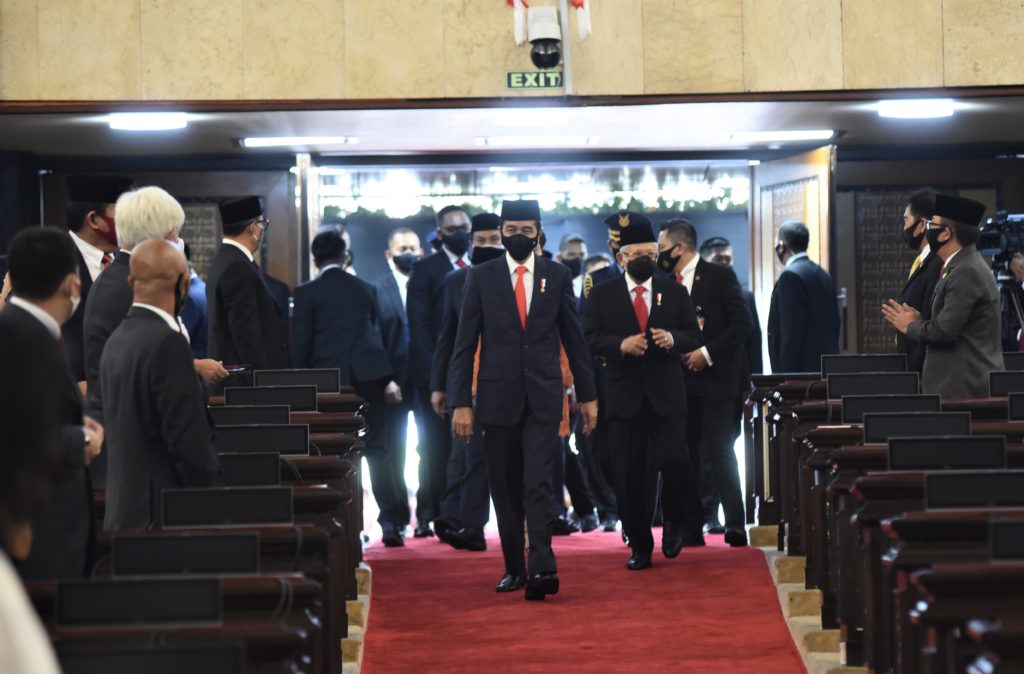Gov’t Projects Economic Growth 2021 to Reach 4.5 – 5.5%

President Jokowi before delivering Address of President of the Republic of Indonesia on the Presentation of the Government Statement on the Bill on the State Budget for the 2021 Fiscal Year and Its Financial Note Before the Plenary Session of the House of Representatives of the Republic of Indonesia, Friday (14/8), at the Nusantara Building, Senayan, Jakarta. (Photo by: the House of Representatives)
According to President Joko “Jokowi” Widodo, the economic growth is projected to reach 4.5 to 5.5 percent and the rate is expected to be supported by increased domestic consumption and investment as the main driving forces.
“Inflation will be maintained at a level of 3 percent to support people’s purchasing power. The Indonesian Rupiah is estimated to be trading at the range of Rp14,600 per US Dollar. In addition, the estimated 10-year Government Securities (Surat Berharga Negara/SBN) interest rate is at 7.29 percent,” the President said in an Address of President of the Republic of Indonesia on the Presentation of the Government Statement on the Bill on the State Budget for the 2021 Fiscal Year and Its Financial Note Before the Plenary Session of the House of Representatives of the Republic of Indonesia, Friday (14/8), at the Nusantara Building, Senayan, Jakarta.
According to him, the Indonesian Crude Price (ICP) is estimated to average US$45 per barrel, while oil and gas lifting is estimated to reach an equivalent of 705 thousand barrels and 1 million 7 thousand barrels of oil per day, respectively.
In 2021 State Budget Bill, he added, the budget deficit is projected at approximately 5.5 percent of GDP or Rp971.2 trillion. The figure is comparably lower than the budget deficit in 2020 of approximately 6.34 percent of GDP or Rp1,039.2 trillion.
“The Health Budget is planned at Rp169.7 trillion or equivalent to 6.2 percent of the State Budget, and geared towards an increase in and equal distribution of supply, as well as facilitation for the procurement of vaccine; nutrition improvement for pregnant and lactating mothers and toddlers, management of infectious diseases, and accelerating stunting reduction; ensuring more effective and sustainable national health insurance program, and; strengthening disease prevention, detection, and response, as well as the integrated health system,” the President explained.
He went on to say that education budget in 2021 amounting to Rp549.5 trillion or 20 percent of the State Budget will be focused on improving the human resources quality, capacity to adapt to the ever-changing technology, and productivity through better knowledge in digital economy of the Industry 4.0 era. The Government will carry out educational reforms through leadership transformation of school principals, transformation of education and teacher training, teaching in accordance with various learning abilities, global assessment standards, and partnership between regional governments and civil society.
“In addition, other policies in the education sector also include strengthening vocational programs and pre-employment cards, improving early childhood education (Pendidikan Anak Usia Dini/PAUD); improving the effectiveness of education fund schemes (School Operational Fund/BOS, Smart Indonesia Program/PIP, and the Indonesia Endowment Fund for Education/LPDP); accelerating the improvement of the quality of educational facilities and infrastructure, especially in 3T (frontier, outermost, and underdeveloped) regions, and; better-targeting of the Higher-Education Smart Indonesia Card (KIP Kuliah) and higher education funding,” he said.
The President also said that development of Information and Communication Technology (ICT) in 2021 with a budget of Rp30.5 trillion (including through Transfer to the Regions and Village Funds/TKDD) will be focused on: accelerating government digital transformation; ensuring effective and efficient public services, particularly in the education, health, and government sectors; consolidating and optimizing shared infrastructure and services; and ensuring public participation in priority development areas and promoting equality with additional internet access in approximately 4,000 villages and sub-districts in 3T regions. (TGH/MAY/EN)
Translated by : Rany Anjany
Reviewed by: Mia Medyana








